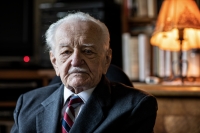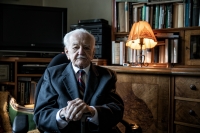I remembered Luther and returned to the Communist dictatorship to face prison

Download image
As a fresh officer of the Hungarian army, he participated in the fighting at the end of World War II. In 1945 he was taken captive by the British forces, which is why he had to leave the army after Communists came to power in Hungary. He then made his living as a herdsman, warehouseman and a truck driver. When the British Embassy in Budapest invited applications for a driver, he signed up and got the job. Thanks to that he served as a messenger between the insurgents and the West during the Hungarian Revolution of 1956. The uprising was brutally suppressed by the Soviet army, led by General Konev. László risked his life, when he and his friend Árpád Göncz (who later became president) smuggled the last declaration of Imre Nagy, the revolutionary prime minister who was executed in 1958, to the West. Similarly, he managed to get the work of István Bilbó, a minister of the revolutionary government and a political scientist, with whom Laszló was sentenced in 1957, out of the country. The sentence was 15 years in prison, but he was freed after six years thanks to the intervention of UN General Secretary U Thant. After his release in 1963 he worked as an unskilled laborer and later as a translator. In 1988 he founded the Historical Justice Committee, an organization uniting Communist persecution victims, similar to the Czech Confederation of Political Prisoners. Laszló lives in Budapest in a house with a beautiful view. He practically doesn’t leave the house anymore; he is taken care of by his family, who waited for him for six years during the Communist era.






